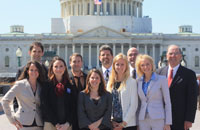|
MUSC physician
assistant (PA) students joined
fellow students and practicing PAs
from across the country in
Washington, D.C., to meet with
legislators and promote health
care issues as part of American
Association of Physician
Assistants' (AAPA) National
Call-In to Congress Day.
 A South Carolina AAPA
contingent and MUSC PA students
journeyed to Washington D.C. as
part of their annual Capitol
Connections effort. Attending are
Jesse Blanton, back row, from
left, Colin Johnson, Tim Stuart,
Paul F. Jacques, Rebecca Patton,
Megan E. Fulton, Ali Whitten,
Melissa Whitson and Victoria
Gleichman. A South Carolina AAPA
contingent and MUSC PA students
journeyed to Washington D.C. as
part of their annual Capitol
Connections effort. Attending are
Jesse Blanton, back row, from
left, Colin Johnson, Tim Stuart,
Paul F. Jacques, Rebecca Patton,
Megan E. Fulton, Ali Whitten,
Melissa Whitson and Victoria
Gleichman.
The annual
event brings together advocates
who engage with legislators and
staff in face-to-face meetings,
communicating their profession's
legislative priorities, according
to Megan E. Fulton, PA, Department
of Neurosurgery and South Carolina
AAPA Lowcountry representative.
Fulton was among a group of
practitioners and students who
were part of a South Carolina
contingent attending this year's
event March 26 – 27.
The first day
was spent in a training session
learning about multiple issues
that PAs face in their work such
as allowing them to provide
hospice care to Medicare
beneficiaries; making PAs eligible
for Medicaid Electronic Health
Record incentives; enabling PAs to
assist in the care for federal
workers injured on the job; and
ensuring continued federal support
of PA educational programs through
Title VII.
California
Congresswoman Karen Bass, who was
the first PA elected to Congress,
was the guest speaker and provided
motivational guidance.
AAPA predicts
that the number of practicing PAs
will increase from 83,466 in 2010
to 128,174 in 2018. The Bureau of
Labor Statistics predicts that PAs
will be the second fastest-growing
profession in the next decade.
SCAAPA members
in attendance included Tim Stuart
(president), Paul F. Jacques,
Fulton, Michael Petrillo and MUSC
PA students: Colin Johnson,
Rebecca Patton, Jesse Blanton,
Victoria Gleichman, Ali Whitten
and Melissa Whitson.
Whitson was
among several students who felt
positive about this advocacy
experience.
"Attending this
year's Capital Connections not
only gave me a better
understanding of the way our
government works, but it also made
me appreciate how, as future PAs,
we can help influence positive
changes that can make a big
difference in our profession. It
was great to be among
professionals and other students
from all over the country and see
so much national support for PAs."
Gleichman also
felt empowered by the unity of
this effort.
"I'm excited
for the patients, PAs, and health
care providers who will benefit
from the visit to Capitol Hill. It
was great to be part of a team
that is going to make changes in
South Carolina."
|



 A South Carolina AAPA
contingent and MUSC PA students
journeyed to Washington D.C. as
part of their annual Capitol
Connections effort. Attending are
Jesse Blanton, back row, from
left, Colin Johnson, Tim Stuart,
Paul F. Jacques, Rebecca Patton,
Megan E. Fulton, Ali Whitten,
Melissa Whitson and Victoria
Gleichman.
A South Carolina AAPA
contingent and MUSC PA students
journeyed to Washington D.C. as
part of their annual Capitol
Connections effort. Attending are
Jesse Blanton, back row, from
left, Colin Johnson, Tim Stuart,
Paul F. Jacques, Rebecca Patton,
Megan E. Fulton, Ali Whitten,
Melissa Whitson and Victoria
Gleichman.